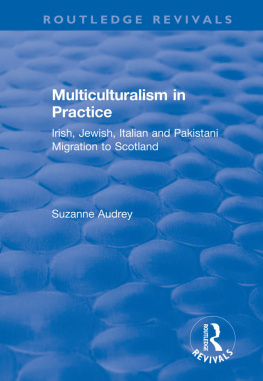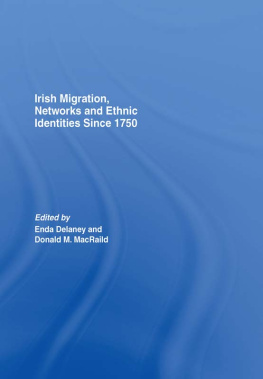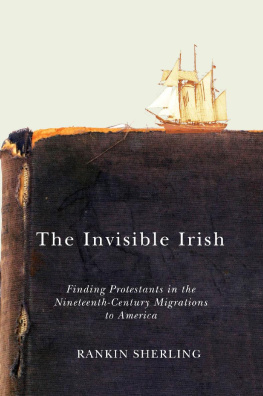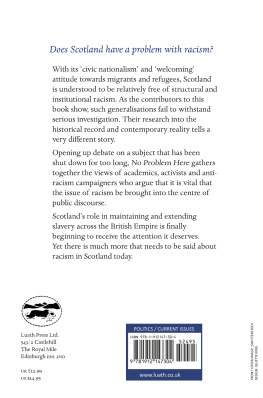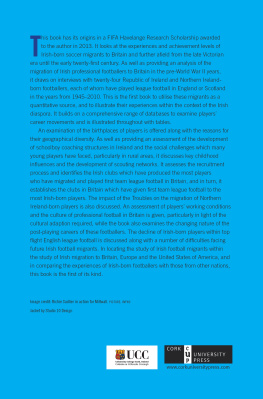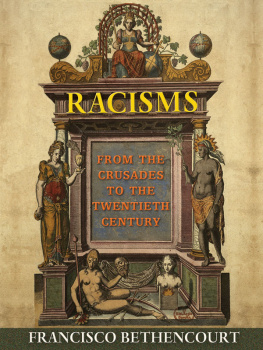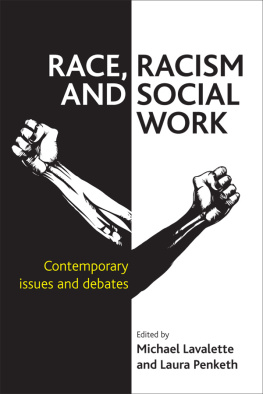MULTICULTURALISM IN PRACTICE
Multiculturalism in Practice
Irish, Jewish, Italian and Pakistani migration to Scotland
Suzanne Audrey
First published 2000 by Ashgate Publishing
Reissued 2018 by Routledge
2 Park Square, Milton Park, Abingdon, Oxon OX14 4RN
711 Third Avenue, New York, NY 10017, USA
Routledge is an imprint of the Taylor & Francis Group, an informa business
Copyright Suzanne Audrey 2000
All rights reserved. No part of this book may be reprinted or reproduced or utilised in any form or by any electronic, mechanical, or other means, now known or hereafter invented, including photocopying and recording, or in any information storage or retrieval system, without permission in writing from the publishers.
Notice:
Product or corporate names may be trademarks or registered trademarks, and are used only for identification and explanation without intent to infringe.
Publisher's Note
The publisher has gone to great lengths to ensure the quality of this reprint but points out that some imperfections in the original copies may be apparent.
Disclaimer
The publisher has made every effort to trace copyright holders and welcomes correspondence from those they have been unable to contact.
A Library of Congress record exists under LC control number: 00134482
ISBN 13: 978-1-138-73783-9 (hbk)
ISBN 13: 978-1-315-18517-0 (ebk)
I would like to thank the many individuals, families, and community groups who offered me support while I was working and researching in Govanhill. In particular, the fieldwork would have been impossible without the help of Sumbla Bashir Qur'eshi, and the respondents who gave their time for no other reason than to promote understanding. I am very grateful to them all.
I would also like to thank Bob Miles for his encouragement and supervision over many years; Derek Lang for his assistance with the preparation of the manuscript; and the 'Thursday night' crowd, especially Margaret Black, for their friendship.
My parents, Audrey Betty Honeywell and S Norman J Hawken, have been constant in encouraging me to pursue the opportunities that they were denied. This book is dedicated to them and to my son, James Thomas. During the course of the research, James married Toni and I was delighted to gain the status of 'granny' when Grace was born. May she grow up, with her soon-to-be-born brother Max, to cherish the diversity and the symmetry of humankind.
Suzanne Audrey
Glasgow, July 2000
This book does not focus on semantics but it is recognised that a number of the terms used are problematic and require some clarification. Additional references to terminology occur throughout the text, particularly in the introduction and .
Immigrant
Unfortunately, racist discourse often portrays immigration as a problem and the term 'immigrant' has developed negative connotations. The word is used here simply to refer to someone who changes his or her place of abode from one country to another. Thus it is possible to distinguish those who moved from Pakistan to Scotland, from their descendants who were born in Scotland. This is important because it will be argued that a sense of location is an important aspect of identity.
'White' and 'Wider Population'
These terms refer to the majority of the population in Scotland who would not classify themselves, using the categories available in the Census 1991 Report for Scotland, as 'Pakistani', 'Indian', 'Bangladeshi', 'Chinese', 'Other Asian', 'Black African', 'Black Caribbean' or 'Black Other'. Although 'White' and 'wider population' are unsatisfactory terms, they are used in preference to 'indigenous', 'host' or 'Scottish' which, it will be shown, are entirely inappropriate.
Minority Ethnic Group
This is used in preference to 'ethnic minority group' as it expresses more clearly that we all have ethnicity, but some 'ethnic groups' constitute a minority in Scotland. However, on occasions the language used is that of the particular agency under discussion e.g. some reports refer to 'ethnic minorities' or 'black and ethnic minority groups'.
Pakistani
Most of fieldwork respondents were not born in Pakistan and would not choose this as a single preferred identity. However, respondents who were born in India, Pakistan, Scotland and England accepted 'Pakistani' as an aspect of a multiple identity. It was also an ethnic category in the Census 1991 Report for Scotland. As such, it represents a common factor of identification for the individuals who are the subjects of this thesis.
Multiculturalism and Integration
Throughout this book 'integration' and 'multiculturalism' are linked and refer to a continuous process through which newcomers arrive and settle and, in negotiating aspects of their identity, shape local conditions into which subsequent newcomers settle. Thus, 'multiculturalism' refers to the process through which aspects of different cultures are asserted and acknowledged within a wider social context; and 'integration' refers to the interaction between relative newcomers and an existing population through which aspects of culture are adapted and shared.
It is not suggested that this process involves actors with equal access to power, or that the process is linear. However, it is argued that policies that promote multicuituralism and integration can undermine exclusionary practices that act as barriers to minority ethnic group participation in the labour market, education system and welfare services.
This is a very important book because the author was able to execute her preference for a focus on anti-racism and how to encourage multiculturalism in practice without ignoring crucial theoretical issues that are essential for understanding the practical problems. Dr Suzanne Audrey started by examining the growing scepticism in research towards grand theory and rightly concluded that attempts to theorise multiculturalism and anti-racism should be grounded on research rather than encouraging theoretical factionalism that tends to become an obstacle to research. Another quality that recommends this book to a wide range of readership is the close attention to history that the author systematically presents.
This is not just a book about one immigrant community but a fascinating account of the history of Glasgow as a religious and trading city at the height of the transatlantic slave trade and the British Raj in India. With that broad historical background, the reader is quickly introduced, one chapter at a time, to the dramatic histories of Irish, Italian, Jewish and Pakistani immigration to the city of Glasgow. Each of these groups came with a rich cultural heritage of different religious faiths, labour traditions and entrepreneurial skills. Each of them faced crude racism of the biological sort and yet each strove to assert their cultural identity, resulting in a rich multicultural heritage in modern day Glasgow.
However, the book warns that emphasis on multiculturalism the way it is practised in the USA could blind researchers and policy makers to the prevalence of racism and the need to develop anti-racist strategies suitable to conditions on the ground.
Dr Biko Agozino
Associate Professor
Indiana University of Pennsylvania

